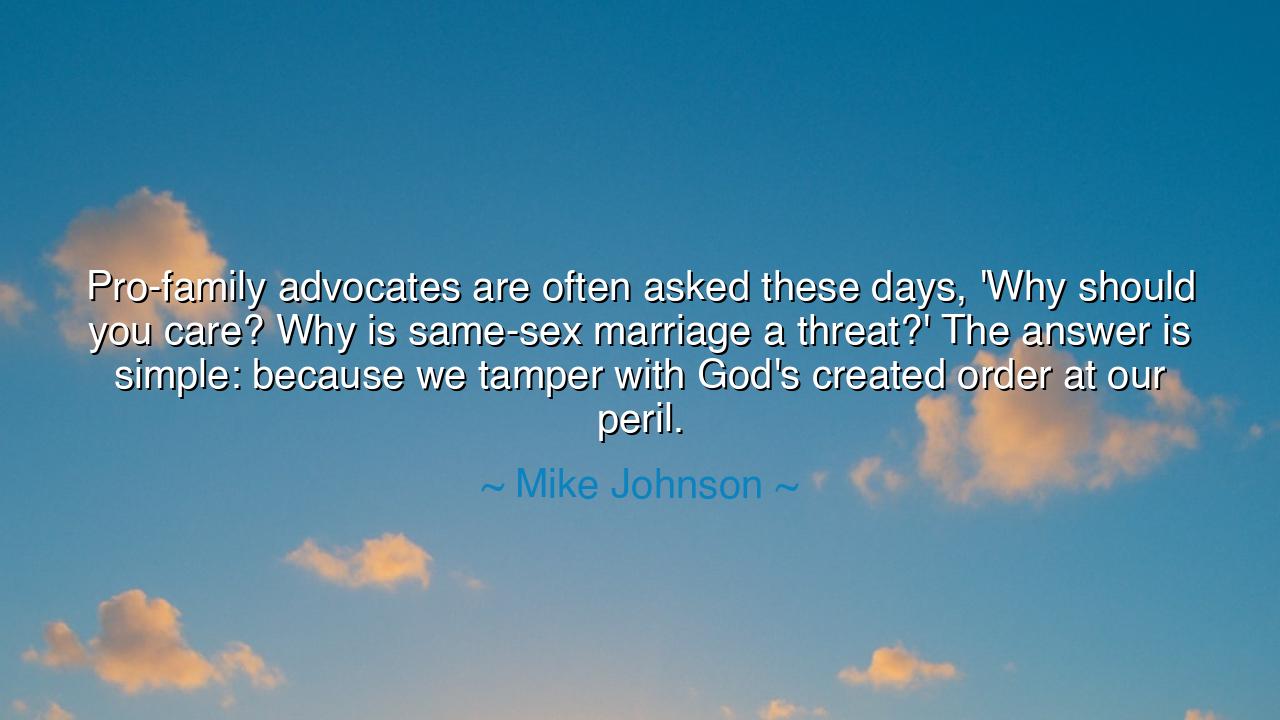
Pro-family advocates are often asked these days, 'Why should you
Pro-family advocates are often asked these days, 'Why should you care? Why is same-sex marriage a threat?' The answer is simple: because we tamper with God's created order at our peril.






Hear now, O listeners of the present age, the solemn words of Mike Johnson, who declared: “Pro-family advocates are often asked these days, ‘Why should you care? Why is same-sex marriage a threat?’ The answer is simple: because we tamper with God’s created order at our peril.” These words, weighty and ancient in tone, echo the cries of prophets who warned their people not merely of political danger, but of spiritual imbalance. In them lies not a judgment of persons, but a belief — that the world was formed upon divine principles, and that to stray from those foundations invites a reckoning both seen and unseen.
To understand the spirit of this quote, one must see that it springs from a worldview as old as civilization itself — the belief that the universe is governed by order, and that every act of creation, from the birth of the stars to the union of souls, carries within it a sacred design. Those who speak of God’s created order believe that life, love, and society find their meaning in harmony with this design. For them, to redefine what has been sanctified since the dawn of humanity is not progress, but peril — not liberation, but confusion of purpose.
In every age, there have been those who sought to alter the eternal patterns to suit the desires of the moment. The builders of the Tower of Babel were among the first to attempt this — uniting not in reverence for God, but in defiance of Him, saying, “Let us make a name for ourselves.” Yet their tower, proud and gleaming, fell to ruin when language itself fractured. The lesson of Babel remains: when humankind raises itself above the divine order, even the mightiest foundations crumble, for they are built upon pride rather than truth.
And yet, the heart of Johnson’s warning is not cruelty, but concern — a cry born of conviction that families form the cornerstone of society. In his eyes, the weakening of that cornerstone endangers not just individuals, but nations. He speaks as one who sees civilization as a garden, and marriage as the soil from which all other virtues grow — faith, stability, compassion, and continuity. To tamper with the soil, he warns, is to risk the harvest. Whether one agrees or not, his words are steeped in the timeless belief that moral order and divine order are bound as one, and that the prosperity of the human soul depends on their alignment.
Consider the fall of Rome, whose grandeur was unmatched and whose armies stretched across continents. Yet when discipline gave way to indulgence, when family honor gave way to self-interest, when the sacred was mocked and moral clarity lost, the empire began to decay from within. No invasion could have conquered Rome had its people remained bound by virtue; it was the unraveling of that moral fiber that opened its gates. So too, Johnson’s warning calls modern society to reflect: What becomes of nations when the truths that once bound them together are replaced by the whims of the hour?
And yet, wisdom also demands compassion. To speak of God’s order without love is to become rigid and blind. The ancients knew that the law without mercy is tyranny, and mercy without law is chaos. Thus, even as Johnson defends what he believes to be sacred, so too must every generation balance conviction with grace. For no belief, however holy, can bear fruit if it is not rooted in love for one’s neighbor.
Therefore, the lesson, O seekers of truth, is this: whether you stand with or against these words, do not treat them lightly. They speak to a deeper struggle — between the eternal and the temporal, between divine order and human desire. To honor creation is to seek understanding before judgment, and to act not from fear, but from reverence. If you believe in God’s design, live it so beautifully that others see light in your example. If you question it, do so with humility, not scorn.
For in the end, the peril is not merely in tampering with order, but in forgetting that all life — all love, all community — demands reflection, discipline, and reverence. Let each person, therefore, look within and ask: “Am I building my life upon pride or upon principle?” For the fate of the world, as of every soul, is written not in the laws of man, but in the unseen harmony between truth and love, the eternal music of creation itself.






AAdministratorAdministrator
Welcome, honored guests. Please leave a comment, we will respond soon